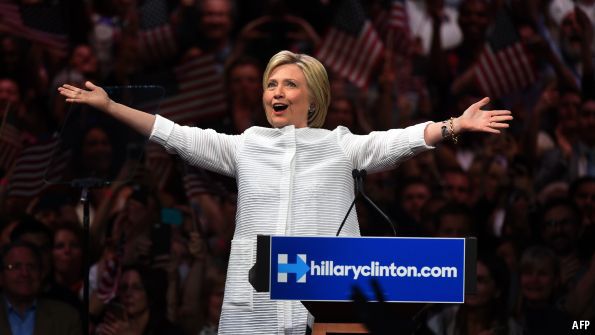Bern out?

As California, New Jersey, Montana, New Mexico, and North and South Dakotas went to the polls in the last stretch of the primary-election season, Mrs Clinton was finally able to declare herself the first woman to become one of the two major party’s nominee for the presidential election. Later in the evening she won New Mexico, South Dakota and California. She lost North Dakota, a sparsely populated state in the Midwest where Mr Sanders received 64% of the vote, and Montana, where Mr Sanders got 51% of the vote. She graciously congratulated Mr Sanders for generating so much excitement with his campaign and especially for his success with the young. The vigorous debate (between her and Mr Sanders) has been very good for the Democratic Party and for America, she said.
Though New Jersey was the second-most populous state to vote on June 7th, all eyes were still fixed on California, America’s most populous state, with 475 pledged delegates at stake for the Democrats and 175 for the Republican Party. Polling stations had not yet closed in the Golden State when Mrs Clinton gave her victory speech; through a mix of pledged delegates and so-called superdelegates (office bearers), who have come out as her backers, she already had reached the 2,383 delegates needed to clinch the nomination without counting a single Californian delegate. A few hours later she would be even more confident in celebrating her designation as her party’s presumptive nominee. Mrs Clinton won California with a convincing 57% of the vote, compared with 42% for Mr Sanders.
The evening seemed at times like the unofficial kick-off of the general election. In her victory speech, Mrs Clinton said this election was different—and not about the same old fights between Republicans and Democrats. “We are better than this,” she said. “We won’t let this happen to America.” She then launched some robust broadsides against Mr Trump. “Donald Trump is temperamentally unfit to be president,” she proclaimed. “He’s not just trying to build a wall between America and Mexico, he’s trying to wall off Americans from each other,” she said. “When he says ‘Let’s make America great again’, that is code for ‘Let’s take America backwards’.”
Mr Trump, who is the only candidate still in the race for his party, won all five states where Republicans voted (they weren’t voting in North Dakota) but his victory speech at a golf club in Briarcliff Manor, New York was uncharacteristically subdued. He has been under fire for days from senior Republicans, including Paul Ryan, the Speaker of the House, after claiming that a Mexican-American judge in a lawsuit involving Trump University was biased against him because of his heritage—and that a Muslim judge might be similarly partial. Mr Ryan called Mr Trump’s remarks “racist”; Mark Kirk, a Republican senator from Illinois, said that he cannot support Mr Trump because he doesn’t have the “temperament” to assume the greatest office in the world. Other senators indicated they may follow Mr Kirk’s lead.
Flanked by his decorative daughter and wife, and reading from a teleprompter, Mr Trump didn’t apologise for his most recent mega-gaffe, but focused on attacking Mrs Clinton. He said she had “turned the State Department into her private hedge fund” and claimed “the Clintons have turned the politics of personal enrichment into an art form for themselves”. He then tried to reach out to the disappointed supporters of the other insurgent candidate, Mr Sanders, deploring how Sandernistas have been “left out in the cold by a rigged system”.
A recent poll by Quinnipiac University found that around three-quarters of Sanders voters would vote for Mrs Clinton in the general election. Judging by how quickly many Republicans have lined up behind Mr Trump once he clinched the nomination, the eventual number might be even higher. Mrs Clinton will need all the support the Sanders fans can give her. The Quinnipiac poll also found that voters by now dislike Mrs Clinton almost as much as they dislike Mr Trump. Those surveyed gave Mrs Clinton a 57% unfavourable rating, with 37% favourable, whereas Mr Trump got only slightly worse ratings, with 59% unfavourable and just 34% favourable.
President Barack Obama called Mrs Clinton on June 7th to congratulate her; he also called Mr Sanders. He will meet Mr Sanders on June 9th, presumably to add his voice to those of the Democratic Party bigwigs who for weeks have been leaning on Mr Sanders to bow out for the sake of party unity. It may be a few days—or much longer. In 2008 Mrs Clinton took four days to suspend her campaign after Mr Obama had been declared the Democratic Party’s presumptive nominee.







No comments:
Post a Comment